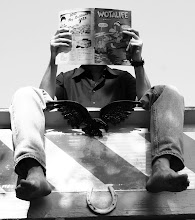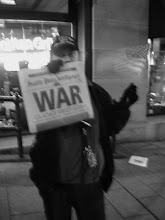
If cities were cartoons, if their personalities were engineered by cartoonists, I would put extroverted metropolises like New York City, Baltimore, and Chicago, firmly in the hands of Roy Crane and Elzie Segar, the creators of Captain Easy and Popeye, two of the most pugnacious characters in the annals of comics history.
A city like Seattle, on the other hand, could only be the creation of a contemporary creator like Daniel Clowes or Adrian Tomine, that modern breed of cartoonist whose characters generally think the majority of their interactions, contemplating action and confrontation, rather than actually encountering it.
I was recently reminded of this diametrical difference between North America’s urban clusters when I was accosted by three burly, bearded toughs, shanghaied on the city docks, pummeled silly in a hovering cloud of dust, arms and legs flitting about me like mosquitoes, the air blue with spirited cursing, lovingly-drawn skulls and crossbones, daggers, and little bottles of poison hanging over me, all this dynamic interaction leaving me with a battered, bruised noggin’ and popsicle stick, plus a black eye as perfectly splendid in form as anything the funny pages can offer. Really. Honest. It happened.
OK, I’ll admit, I’m lying. I wasn’t actually roughed up by tuffs. That sort of thing happens in Hoboken, not the “comfy slipper” of urbanity we call Seattle. The truth is I received my multi-hued blemishes and muscle aches after foolishly attempting to pull on a pair of gloves, speeding down a nighttime street while riding my bicycle, the sort of prank better men than me would have accomplished with aplomb. No Buster Keaton am I. Nevertheless, my tell-tale black eye was brilliantly in evidence the next morning, growing and shifting as the hours and days passed, migrating like an epidermal oil spill, closely followed by the cuts and swelling, all forming a very “cartoony” picture, to say the least.
Having had my moment of pulpy interaction, seeing stars, my hat and glasses flying off my head, no less, I proceeded about my business in the Emerald City, this demure town I have called home for some fourteen years. I visited the bank, the grocery store, the post office, the zoo, the bicycle shop, the tavern, even the optometrist, and not once was I asked about my royal shiner, my splendiferous shanty, my gorgeous goog. Not even a subtle hint or polite whisper did I receive. The fine, reserved gentry of Seattle simply avoided it altogether, as if it didn’t even exist. It was a systemic politeness, a courtesy unchecked, a decorum gone mad I decided, after a full week facing this deafening aphonia. I appreciate tact, of course, and don’t wish to have complete strangers poking me in the eye on a regular basis, but this stony wall of avoidance was a bit too much. It made me wonder if Seattleites have any comical spirit at all. What are they so afraid of, I had to wonder.
Even in a fatgiued municipality like Pittsburgh, my previous haunting ground, where economic realty has taken the wind out of many a once-vociferous windbag, I would have been on the butt end of at least one good ribbing from a stranger. “Whatcha doo, buddy? Slip in the pisser? Try kissin’ a keyhole? Wake up on the wrong side of yer Granma? Haw, haw, haw.” It would have been downright unfriendly not to have been greeted, at least once in the afternoon, by such a comment. But Seattle had nothing to offer, not even a mundane “I hope the other guy’s eating hospital food.” Nothing. Zilch. Nada. Zero.
Jet City ain’t go no zip in its lip, I tell ya. Can this town really be so twisted up in its liberal identity that it’s taken all of the fun out of the inherently comical mishaps of life? Are we so afraid of coming off as something less than a politically correct model of civility and sensitivity that we’ve lost our whimsy, our spirit, our sense of humor? Really, how bad could the truth be, how terrible, how absolutely awful that it makes a city, one known for pointing out the elephant in the room, both political and social, clam up like kids before a broken window? Was it presumed that I’d lost a fight, the subsequent embarrassment having placed me on the teetering edge of suicidal recourse? Or perhaps my wife or girlfriend had given me my “purple mouse” with an impressively-aimed remote, on account of me insisting we watch David Suzuki’s The Nature of Things in lieu of America’s Next Top Model. Maybe I did try to kiss a keyhole (meaning I caught my eye with the doorknob, for those of you who didn’t quite get that one). Or, geez, maybe I really was punched by a loved one or family member, the two being mutually exclusive in such an event. As they say in the “less-enlightened” territories, folks, shit happens, you just have to learn to roll with it. Anyone who has ever been through great adversity or grief knows how precious humor and laughter is, knows that acknowledgement, even in the form of a little teasing, is far better than uneasy silence.
My parents lived through Hitler’s bombardment of England. When I ask them about it they never fail to laugh at the memories; my mother’s father, Papa to me, with his ill-fitting helmet and unwieldy rifle, waddling off up the nettle-lined country hillocks to defend the Queen’s soil, his corn-addled feet the pride of the Home Guard, even as my mother shielded herself under the kitchen table, only a candle for light, German “doodlebugs” shaking the roof of the little farmhouse as they shattered the heavens, on their way to an explosive collision with the buildings and people of London. My father finds great humor in how inadequately prepared Britain was for Hitler’s forces, how easy it would have been, he claims, for the Germans to have crossed the Channel and have taken another sovereign nation, poor Papa not being much to object if they had. Anguish, horror, tragedy, these are the birthplaces of comedy, as any true cartoonist or comedian knows. Even the term doodlebug points to this, the comical moniker having stemmed from the sound the loose shrapnel made as it whirled about inside the Fuhrer’s missiles of destruction.
A man with a black eye wanders into a bar, see? The barkeep gives him one look and reaches out and slugs him in the other eye. “Whot you do that for?” cries the man, sprawled on his keister beneath the bar, blinking like a raccoon. “Saving,” replies the bartender. “Savin’?” asks the man, hugging a stool as he staggers to his feet. “Savin’ whot?” “Saving me the trouble,” grins the keep. “And saving you the cost of a few beers.”
You see, Seattle, you just need to loosen up a little bit. By all means, be sincere, be concerned for the welfare of others, take note of the injustices and inequalities of life, of our plundering civilization and its cadre of rubes and charlatans, and do your good deeds, please, but don’t forget where comedy comes from, don’t suppress that laugh when misfortune offers its moments of slapstick, because it’s going to, whether you like it or not. The news on the front page might well be a crying shame, and most usually is, but that’s why they put the funny pages in the back, to give you some relief. The next time you come across someone with a nice shiner, at least grin and offer them a consoling “Ouch, that’s gotta hurt!” What are they going to do? Punch you in the eye?
























































